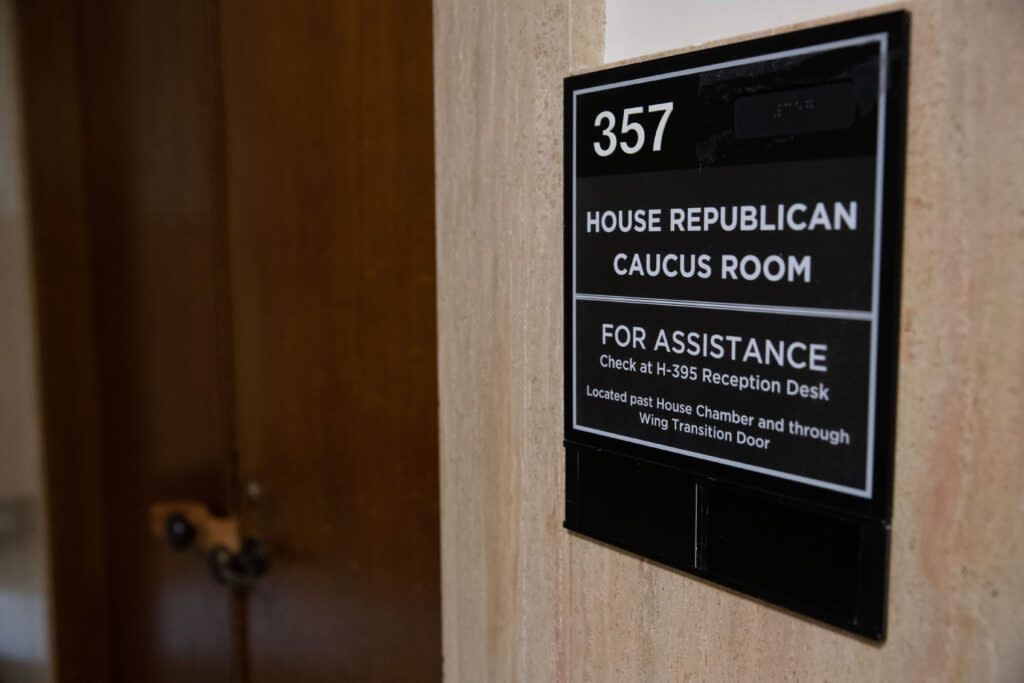Two Oregon House Republicans lose primaries without help from GOP caucus, campaign arm

- Oops!Something went wrong.Please try again later.
- Oops!Something went wrong.Please try again later.
- Oops!Something went wrong.Please try again later.
- Oops!Something went wrong.Please try again later.
Two House Republicans lost their primary elections on Tuesday. (Amanda Loman/Oregon Capital Chronicle)
Two incumbent House Republicans lost their jobs in election night blowouts on Tuesday as their caucus and most colleagues stood on the sidelines.
Different factors led to Reps. Charlie Conrad, R-Dexter, and James Hieb, R-Canby, losing their seats: Conrad angered Oregon Right to Life by siding with Democrats on a 2023 law to widen access to abortion and gender-affirming care, while Hieb couldn’t compete with 2022 governor nominee Christine Drazan when she decided to return to the Legislature.
But in both cases, House Republican leaders and members largely looked the other way as their colleagues flailed in tough elections. Conrad ended up garnering just 18% of the vote in the 12th House District in rural Lane County, while Hieb received about 31% of the vote in the Canby-based 51st House District.
“When I refiled, I stuck with my original goal of trying to be that grounded, middle Republican – pragmatic, solution-oriented, that’s pro-choice and protects liberties and going more toward that traditional Republican mindset of small government, low taxes, protecting personal liberties,” Conrad said. “Clearly, as this result shows, I am not the person, I didn’t run the right campaign or a combination of those.”
House Minority Leader Jeff Helfrich, R-Hood River, did not return a call. In a prepared statement congratulating Republican candidates who won primaries on Tuesday, he also didn’t acknowledge the loss of two caucus members.
“Congratulations to all of our Republican candidates who won primaries tonight,” Helfrich said in that statement. “Together, we can end the radical left wing experiment in Salem and get back to basics with common sense solutions to make Oregon more affordable and safer to live and work. Now is the time for positive change, and Oregon Republicans will lead the way.”
Caucus members said the decision to stay out of primary races came down to Helfrich, not the full 25-member Republican caucus. Campaign finance records show House Republicans’ campaign committee, the Evergreen PAC, contributed to campaigns for several Republicans without primary opponents who are running against Democratic incumbents Republicans view as vulnerable, as well as a $5,000 contribution the day before the May 21 primary to Rep. Cyrus Javadi, R-Tillamook. Javadi’s understanding is that the contribution was intended for his general election campaign in a swing district, he told the Capital Chronicle.
The loss of two Republican incumbents stood in sharp contrast to the approach taken by House Democrats and their campaign arm, FuturePAC. The PAC provided logistical support for incumbent Democrats and contributed financially to at least one member’s primary campaign.
“I feel like our caucus is united, and we support one another, and I think we have a strong alignment on our values and on our goals and what we want to do to improve the lives of Oregonians,” said House Majority Leader Ben Bowman of Tigard. “You can see from the results that (Republican caucus members) were not always on the same page, and some of their incumbent legislators will not be returning, so it does look like a different story to me.”

Abortion vote dooms Conrad
A single vote on May 1, 2023, sealed Conrad’s fate as a one-term representative. After hours of tortured debate and procedural motions on the most contentious bill of the 2023 session, through which Conrad stayed quiet, he pushed a button on his desk in the middle of the House floor and his name lit up in green on a pair of screens.
He explained his vote for House Bill 2002, a lengthy measure that expanded access to abortion and gender-affirming care, in a letter, in an interview with the Capital Chronicle and in conversations with every constituent who has asked about it. In short: Conrad has long supported abortion rights, and he concluded after speaking with doctors and parents of trans children that families and medical providers, not the government, should determine appropriate care for trans people.
Oregon Right to Life, an anti-abortion group that’s one of the most powerful forces in state Republican politics, promptly announced a campaign against him. Days after the end of the 2023 legislative session, the organization gathered a small group of supporters for a campaign launch on the banks of the Dexter Reservoir. By the fall, the organization had recruited Darin Harbick, a business owner from McKenzie Bridge who previously ran for the U.S. Senate, to run against Conrad with a campaign entirely built around his vote on House Bill 2002. More than 80% of Republican voters in the district chose Harbick.
“One of the things that this shows is that Oregon Right to Life is the Republican Party,” Conrad said. “They’re the gatekeeper. That’s unfortunate, because that’s only going to polarize things.”
Lois Anderson, executive director of Oregon Right to Life, called the word gatekeeper “interesting terminology,” but didn’t disagree with Conrad that her organization held great power in Republican primaries.
“Do I think that Oregon Right to Life endorsements and Oregon Right to Life resources in the Republican primaries are meaningful? Absolutely,” Anderson said. “Representative Conrad made a vote that was just absolutely in conflict with the majority of people in this district, not just in the Republican primary.”
Rep. Greg Smith, a Heppner Republican and the longest-serving member of the state House, recalled a similar situation during his first term in 2001. Then-Rep. Cherryl Walker, a freshman Republican from Josephine County, angered Oregon Right to Life by supporting requirements that insurance cover contraceptives, and Republican Dennis Richardson, who went on to become secretary of state, defeated her in the next primary.
“Within the Republican caucus, the family and life issue are extraordinarily significant,” Smith said. “The Second Amendment is significant. And then there’s other issues, but really, those two, one could argue, are litmus tests in the Republican caucus.”
Conrad felt strongly about his position and discussed it with the Republican caucus, Smith said, and caucus members fully understood the reaction Oregon Right to Life would have. Only two members of the Republican caucus – Javadi and Deputy Leader Mark Owens of Crane – publicly supported Conrad.
Javadi said he considered Conrad one of the best representatives in their freshman legislative class, and that he thought it was important to keep him around.
“Charlie represented a legislator who was willing to put Oregon first, and that meant that he was going to put partisan politics second,” Javadi said. “I thought that the only way forward to really solving our problems was to have leaders like Charlie who would listen to both sides of an argument and really work through things. His mind could be changed with good evidence and good data, and I thought we needed more leadership like that.”
Owens said he wasn’t surprised by the outcome, but that it was tough to lose Conrad from the caucus. He said he wasn’t part of any conversations about the caucus or its campaign arm, the Evergreen PAC, supporting its incumbents in contested primaries, but that it was an obvious choice for him personally to endorse Conrad.
“My view was that Charlie’s one of the most honorable men that I’ve ever had the privilege to work with, and I’d like to continue to work with him,” Owens said.
Harbick, who did not return a call, doesn’t have a Democratic challenger.

Drazan returns in 51st District
House Republicans also largely stayed out of the fight between Hieb and Drazan in the 51st District, which was almost a battle of two incumbents. Hieb was appointed to replace Drazan when she stepped down in early 2022 to focus on her unsuccessful campaign for governor, and he won election to a full term later that year.
“The Drazan-Hieb race really put the caucus in a difficult situation, having an incumbent versus really another incumbent,” Smith said. “Even though Drazan had stepped down, she was stepping down for what Republicans would perceive as a greater good.”
Hieb campaigned hard to cast himself as the true conservative choice in the Canby-based 51st District, which didn’t draw a Democratic candidate. But he proved no match for Drazan, who raised nearly 10 times as much money as he did and has statewide name recognition from her second-place finish in the most expensive gubernatorial race in state history.
Hieb didn’t return a call, while Drazan thanked voters in a statement on Thursday.
“It was a tremendous honor to have the opportunity to reintroduce myself to House District 51 voters over the past couple of months, and to ultimately earn the support of primary voters,” Drazan said. “As I’ve often said, the future of our state is worth fighting for. That’s why I will continue to advocate for the policies and values I believe in, including cleaning up our streets, being a strong voice for parents in their childrens’ education, prioritizing local control of our communities, and lowering the cost of living.”
Other races
Javadi handily beat back a challenge from retired corrections officer Glenn Gaither, winning more than 70% of the vote in the northern coastal 32nd House District.
“I feel like the appetite on the coast is for practical, moderate leadership and my opponent represents the far, far right-wing Republican Party,” Javadi said. “And I didn’t feel like his message was going to resonate at all with the mood of the district.”
His tougher race is in the general election, where he faces a rematch with Democrat Logan Laity, a small business marketer who he beat by 2.5 percentage points and fewer than 850 votes in 2022.
Darcey Edwards, a real estate agent from Banks, won the Republican primary for the open 31st House District in rural northwest Oregon. Current Rep. Brian Stout, R-Columbia City, opted not to run for reelection after he was barred from participating in committees following a restraining order brought by a former campaign volunteer.
Stout backed Edwards, who defeated fellow real estate agent Aaron Hall with about 81% of the vote. Edwards will face Democrat Jordan Gutierrez, a tax consultant, in November in the Republican-leaning district.
Michael Newgard, an Army Blackhawk helicopter pilot, beat former legislative aide Sue Leslie with nearly 60% of the vote in the 40th House District in suburban Clackamas County. He’ll face freshman Democratic Rep. Annessa Hartman, D-Gladstone, who won the district by just 181 votes in 2022.
GET THE MORNING HEADLINES DELIVERED TO YOUR INBOX
The post Two Oregon House Republicans lose primaries without help from GOP caucus, campaign arm appeared first on Oregon Capital Chronicle.

